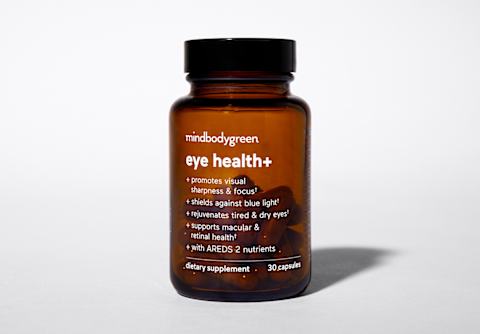Advertisement
8 Ways To Protect Eye Health Today To Prevent Vision Loss As You Age


In today's fast-paced, technology-driven age, visual demands are higher than ever. Since all of the body's systems and organs are connected, it's not surprising that your overall health can also affect your eye health.
It is essential to take care of your eyes early on to maintain clear and healthy vision and prevent eye disease as you get older. Let's take a look at some of the most common eye conditions and how to prevent them using healthy lifestyle practices.
A few common eye conditions
Cataract
Cataract is a condition that affects the crystalline lens of the eye. The naturally clear lens is composed of specialized proteins, called crystallins, that have specific optical properties to help light focus on the retina.
These proteins also function to absorb shortwave (blue) visible light, ultraviolet, and infrared radiation to protect the eye.
As a person ages, oxidative stress leads to the production of free radicals, damaging the integrity of the cells and denaturing these specialized proteins, thus reducing the various metabolic efficiency of the lens. This then induces the formation of a cataract.
Symptoms include blurry, hazy vision with more glare and light sensitivity, particularly at night.
Macular degeneration
Macular degeneration is a condition that affects the retina, particularly a structure called the macula and the underlying tissue called the choroid.
The retina is one of the most metabolically active systems in the body, consisting of multiple layers of specialized cells, which all function together to properly focus light.
It is important to note that the macula has a strong concentration of carotenoids, such as lutein, zeaxanthin, and meso-zeaxanthin, which are naturally occurring pigments that filter high-intensity, short-wavelength (blue) visible light to protect the most sensitive ocular area from light-induced stress1.
As macular degeneration progresses, more drusen accumulate and subsequently trigger the release of vascular endothelial growth factor (VEGF) to promote the formation of more abnormal blood vessels.
There are two types of macular degeneration: dry (or non-neovascular) and wet (or neovascular). Dry macular degeneration happens when there is the presence of drusen only, while wet occurs when new blood vessels form.
The dry form is the earliest, most common form of macular degeneration. The subsequent wet form is more sight-threatening. It is one of the most common causes of blindness and profound vision loss over the age of 60, and it's expected to affect nearly 300 million people worldwide by 20403.
Glaucoma
Glaucoma is another condition that affects the retina, but also a different structure called the optic nerve. A healthy optic nerve transmits signals from the retina to the brain for the interpretation of visual stimuli.
Glaucoma is thought to be a neurodegenerative disease of the eye, similar to Alzheimer's in the brain. Unlike cataract and macular degeneration, which both affect central vision and lead to early symptoms, glaucoma does not have any symptoms until the disease is much more advanced. As such, it is often referred to as the "silent disease."
It's another common cause of blindness, with an estimated number of patients being affected to exceed 110 million by 20404.
Diabetic retinopathy
Diabetic retinopathy is a major complication of systemic diabetes that presents with retinal bleeding and swelling. Hyperglycemia can cause the blood vessels to dilate in a way that leads to retinal ischemia and hypoxia, which triggers the upregulation of VEGF, promoting further vascular permeability5.
It is projected that approximately 160 million patients will present with diabetic retinopathy by 2045. Managing systemic blood sugar is key to mitigating this condition.
Dry eyes
Dry eyes have become a newly growing epidemic, affecting roughly 30 million Americans and at least 350 million people worldwide of all ages. It affects several important structures, such as the tear film, cornea, conjunctiva, and lacrimal and meibomian glands. Some of these are responsible for optical power, which is why patients with dry eyes can present with blurry vision.
Though many people associate dry eyes with red, irritated, and tired eyes, the condition can be serious and debilitating. In its most advanced stage, it has profound effects on vision, eye health, and overall health, leading to vision loss, ocular pain, decreased quality of life, and even severe depression. Inflammation is a leading driver of dry eyes.
Myopia
Myopia is becoming increasingly common in children who present with nearsightedness. It was once thought to be a simple vision error that could be corrected with glasses, contact lenses, or refractive surgery such as LASIK.
However, new studies bring attention to the growing evidence that myopia can increase one's risk of many of the conditions listed above, including cataract, macular degeneration, glaucoma, and retinal detachment6.
My daily eye care checklist
Eye diseases occur due to a combination of genetics, oxidative stress, and inflammation. This means that you can employ lifestyle factors that reduce your chance of the conditions above. Here are a few I recommend adding to your routine:
Get annual eye exams
According to the American Optometric Association, eye exams should begin as early as 6 months of age. The pediatric population should get exams to monitor potential refractive error (with myopia being on the rise), binocular vision development, and the presence of any congenital eye disease. After a child starts school at about age 6, eye exams should be done annually unless sooner warranted.
Wear sunglasses when you spend prolonged periods of time outside
Getting exposure to natural sunlight is beneficial (and essential) for health. The sun provides one of the best forms of vitamin D, and getting some exposure first thing in the morning (ideally before 10 a.m.) is necessary for regulating our circadian rhythms.
It is also critical for myopia prevention and progression. However, too much UV exposure can be damaging to the eyes and increase the likelihood of cataracts, macular degeneration, and several other eye conditions.
If you're planning to spend more than 15 to 30 minutes outside, I recommend wearing sunglasses. And always avoid directly staring at the sun.
Wear blue-light-blocking lenses with prolonged exposure to devices
Many studies do suggest that exposure to blue light (like exposure to UV light) can increase the risk for many of the eye diseases7 mentioned above.
The jury is still out on whether blue-light-blocking glasses benefit your eyes. Studies have not proven that wearing them protects against eye strain and eye fatigue. Anecdotally, though, the majority of my patients actually do report less eye strain and eye fatigue while wearing these lenses.
And with the amount of time we spend on digital devices, I believe it would behoove us to wear blue-light-blocking glasses to protect the health of our eyes and relieve any potential eye strain8.
Eat a Mediterranean-style diet
Food is medicine, and it can fuel eye health, too. Though everyone's nutritional needs are different, eating a Mediterranean-style diet9 seems to be most helpful for preventing ocular disease.
This is because it provides nutrients that are essential10 for overall ocular health, such as antioxidants and anti-inflammatory, neuroprotective compounds. Here's a complete guide to getting started with the Mediterranean diet.
Eating a gut-health-friendly diet can also help reduce your risk of ocular conditions, as the body has a gut-eye axis. As Hippocrates said, all disease begins in the gut!
Supplement as needed
As healthy as your diet may be, nutritional gaps can still exist. This is where supplementation is helpful. Supplements are important for protecting against and preventing further progression of many ocular diseases. Several eye vitamins have been shown to have a protective role, such as:
Consider adding a comprehensive supplement like eye health+ to your routine for overall enhanced visual performance.
Exercise regularly
Numerous studies have demonstrated the importance of exercise on eye health. Physical activity has been shown19 to protect against glaucoma, macular degeneration, and diabetic retinopathy. As for how exercise protects the eyes, several mechanisms19 have been proposed. Ready to get a little nerdy? Here are a few:
- In regards to glaucoma, physical activity increases ocular perfusion pressure and BDNF (brain-derived neurotrophic factor20), which is essential for the health of the neurons.
- With diabetic retinopathy, exercise helps with endothelial vascular function and inflammation control.
- With macular degeneration, it reduces the dysregulation of the complement cascade and oxidative stress while also lowering inflammation.
- With dry eyes, exercise decreases inflammation21 and improves the tear film by stimulating the parasympathetic innervation of the lacrimal gland.
Get plenty of sleep
The importance of sleep for overall health is not surprising. The eyes are no exception8! Many of the restorative and detoxifying mechanisms that happen as we sleep are essential for eye health, as well. Sleep conditions like sleep apnea also increase one's risk of glaucoma.
Use safe beauty products around the eyes
Good hygiene is important for keeping the ocular microbiome balanced. Make sure to clean your eyelids and eyelash margins to keep excess oils and bacteria out of the eyes, and use products that don't contain harsh chemicals.
These ingredients can irritate the ocular surface and contribute to dry eyes, contact lens intolerance, and makeup sensitivity. According to the latest research, a few to avoid include parabens, phthalates, perfumes, and per- and poly-fluoroalkyl substances (PFAS). See this report for a complete list22.
The takeaway
Although some common ocular conditions have genetic predispositions, most are driven by lifestyle factors. Implementing this simple eye health checklist can have meaningful effects not only on your eye health but also on your overall health.
Remember, the body is an intricately connected and integrated ecosystem that works in unison, not in isolation. And creating a healthy ecosystem within will help you better see the world around you.
22 Sources
- https://www.ncbi.nlm.nih.gov/pmc/articles/PMC7347445/
- https://www.ncbi.nlm.nih.gov/pmc/articles/PMC9595233/
- https://www.ncbi.nlm.nih.gov/books/NBK560778/
- https://www.mdpi.com/2673-8392/2/4/124
- https://www.ncbi.nlm.nih.gov/pmc/articles/PMC6032159/
- https://www.ncbi.nlm.nih.gov/pmc/articles/PMC7401976/
- https://www.sciencedirect.com/science/article/pii/S0753332220307708?via%3Dihub#bib0075
- https://pubmed.ncbi.nlm.nih.gov/29044670/
- https://www.ncbi.nlm.nih.gov/pmc/articles/PMC10181476/
- https://www.ncbi.nlm.nih.gov/books/NBK557733/
- https://iovs.arvojournals.org/article.aspx?articleid=2622933
- https://pubmed.ncbi.nlm.nih.gov/30702470/
- https://pubmed.ncbi.nlm.nih.gov/31148351/
- https://pubmed.ncbi.nlm.nih.gov/36547942/
- https://www.ncbi.nlm.nih.gov/pmc/articles/PMC9409742/
- https://pubmed.ncbi.nlm.nih.gov/37026311/
- https://www.ncbi.nlm.nih.gov/pmc/articles/PMC7844666/
- https://pubmed.ncbi.nlm.nih.gov/29206653/
- https://www.ncbi.nlm.nih.gov/pmc/articles/PMC6085324/
- https://www.frontiersin.org/articles/10.3389/fncel.2019.00363/full
- https://www.ncbi.nlm.nih.gov/pmc/articles/PMC10102706/
- https://www.sciencedirect.com/science/article/pii/S1542012423000319?via%3Dihub
